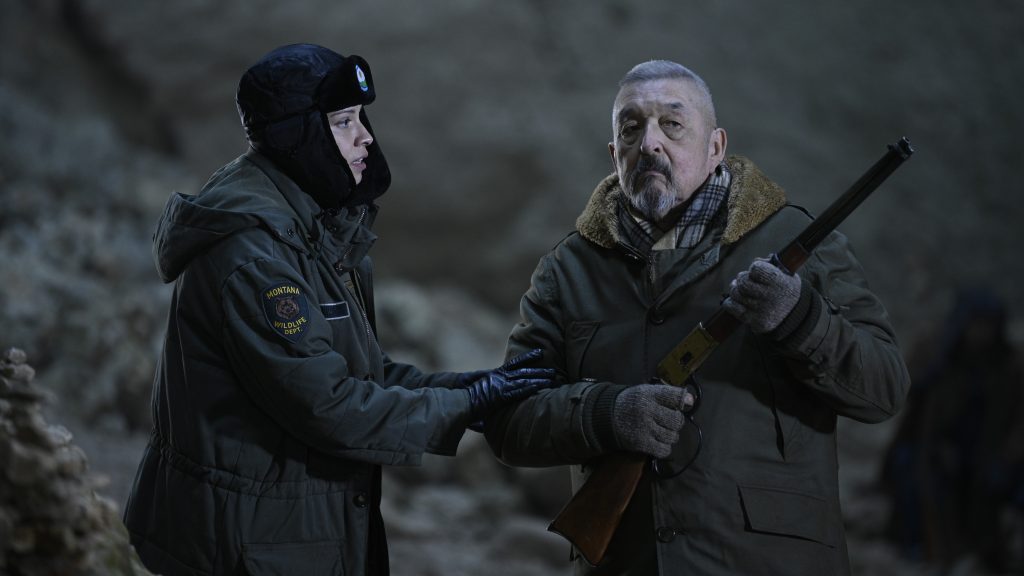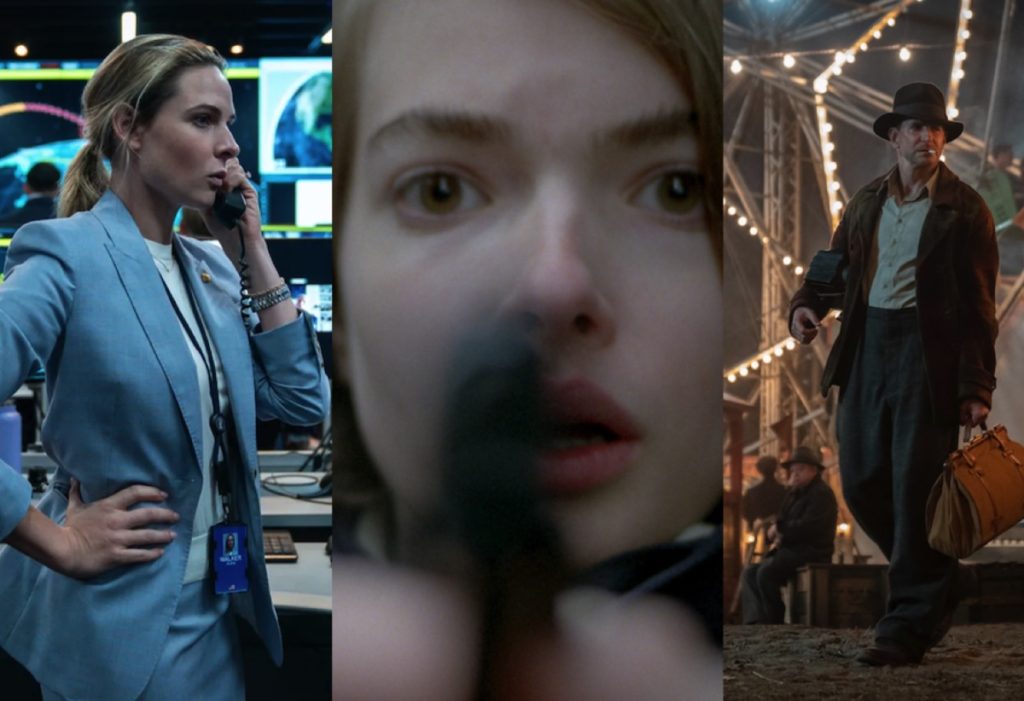Every Tuesday, discriminating viewers are confronted with a flurry of choices: new releases on disc and on demand, vintage and original movies on any number of streaming platforms, catalogue titles making a splash on Blu-ray or 4K. This twice-monthly column sifts through all of those choices to pluck out the movies most worth your time, no matter how you’re watching.
PICK OF THE WEEK:
Shoeshine: Vittorio De Sica won the very first Academy Award for Best Foreign Film for this 1946 classic, entering the Criterion Collection in a glorious 4K UHD edition. It begins (much like his Bicycle Thieves two years later) as a story of grinders and dreamers, focusing on two shoeshine kids who are saving every penny to buy a horse. But when they get drawn into a fencing scheme, they’re sent to a cruel juvenile detention facility, and that’s where De Sica really pulls you in, so deep is our investment in these boys and their troubles. It’s heartbreaking, how this place (and the people within it) splinter a seemingly unbreakable bond. Shoeshine is that rare beast, a successful combination of poignant, human story and scorching indictment of the system, and it’s lost none of its considerable power in the nearly 80s years since its making. (Includes bonus documentary, featurette, radio broadcast, trailer, and essay by David Forgacs.)
ON NETFLIX:
On Swift Horses: Daniel Minahan’s adaptation of Shannon Pufahl’s novel has the lush, widescreen romanticism of studio pictures of its Eisenhower period, and Daisy Edgar-Jones and Jacob Elordi come off like old-fashioned movie stars of the era, sporting the same kind of jaw-dropping but lived-in beauty that Natalie Wood and James Dean had in Rebel Without a Cause, or Wood and Warren Beatty in Splendor in the Grass. That resemblance doesn’t seem accidental; it’s of that film’s ilk but it can say the things Kazan and company could not, explicitly telling a story of sexual fluidity and the secrets we all keep. There’s a kind of simmering sensuality throughout, particularly in Edgar-Jones’s work—hers is a nicely layered performance, carefully revealing the fire under the cool surface. There are some pat scenes in the home stretch, but this is a strong effort overall, with a big-swing ending that connects beautifully.
ON 4K / BLU-RAY / DVD / VOD:
Bring Her Back: Danny and Michael Philippou’s follow-up to Talk to Me boasts the same dynamic sense of craft and similar sense of mounting dread — and has the sophomore film feeling of attempting to crank up and outdo what came before. Here, that means there are images and sequences so deeply unsettling, so thoroughly unpleasant, that it becomes too hard to take, at least for anyone other than gore-hounds. Which is not to say that it’s not worth seeing; Sally Hawkins is spectacular in a haunting turn as a foster mother whose gee-whiz nature proves (unsurprisingly) false, and its conclusion is highly satisfying, up to and including a doozy of a closing image. It gets under your skin, but in an awfully uncomfortable way. (Includes audio commentary and featurette.)
ON 4K:
Blaxploitation Classics Vol. 2: Shout Factory’s second box set of favorites from the golden age of Black crime cinema does feel, in some ways, like leftovers; placed comparatively, Jim Brown’s Slaughter and Slaughter’s Big Ripoff feel like the lesser cousins of Fred Williamson’s Tommy Gibbs duo, Pam Grier’s Foxy Brown and Friday Foster aren’t quite up to Coffy, and there’s no equivalent to the next-level excellence of Across 110th Street. But Cotton Comes to Harlem comes awfully close, Foxy and Friday have pleasures of their own, and it’s a real kick to see Williamson and Grier team up in the underrated Bucktown. And again, Shout goes above and beyond with these high-quality restorations, giving them the sleek sheen of the crowd-pleasers they always were. (Includes audio commentaries, interviews, documentary, and trailers.)
City on Fire: Shout is doing similar cinephile public service with their upcoming releases of classic Hong Kong action flicks of the ‘80s and ‘90s, many of them long unavailable, in any kind of legal release, on our shores. This is the first of those films, and it’s an appropriate kick-off, in a way; as even casual fans know, it was the “inspiration” (generously speaking) for Reservoir Dogs, whose director played an outsized role in bringing these movies to the attention of his American acolytes. Seeing it ultimately makes the case for Tarantino’s departures — there are points of intersection, but it has a markedly different style and structure. The look is grimy and streetwise, the mayhem is well executed by director Ringo Lam, and star Chow Yun Fat is, as always, pure burning charisma. (Includes audio commentary, interviews, and trailer.)
Sense & Sensibility: Sony first released director Ang Lee and screenwriter Emma Thompson’s 1995 adaptation of Jane Austen’s masterpiece as part of their second “Columbia Classics 4K Ultra HD Collection”; this stand-alone release doesn’t alter that restoration, nor should it. The vibrant colors, gorgeous costumes, and impeccable sets retain their casual beauty; they look great, but they also look inhabited, as opposed to the museum pieces of too many period dramas. More than that, the emotions feel immediate and vibrant, with Thompson’s elegant screenplay cutting to the (beating, bleeding) heart of Austen’s poignant story. (Includes audio commentaries, featurettes, deleted scenes, and trailers.)
The Rundown: Peter Berg and Dwayne “The Rock” Johnson were both at key inflection points when they made this buddy action comedy in 2003 — Berg hoping to prove himself not just an actor but a director, Johnson as not just a wrestler but an actor. They both acquitted themselves nicely; Berg stages his action sequences and comic beats with equal skill, and Johnson is a more than credible, and charismatic, leading man. Throw in Seann William Scott in one of his best non-Stiffler turns, Rosario Dawson in compellingly enigmatic form, and Christopher Walken leaning in to His Whole Thing, and you’ve got a highly rewatchable programmer, crisply remastered and presented by KL Studio Classics. (Includes audio commentaries, featurettes, deleted scenes, and trailer.)
Happy Gilmore: KL’s 4K presentation of Adam Sandler’s sophomore starring vehicle feels just a moment too late — it would’ve been nice to have on hand in the run-up to Happy Gilmore 2 — though meat-and-potatoes comedies like this rarely seem to cry out for such a high-def treatment. But it remains one of his most purely enjoyable efforts and one of the most successful containers for his prickly persona, with Sandler starring as a wannabee hockey player whose killer slap shot turns him, all but against his wishes, into a successful golfer. Some of the bits don’t quite hit, but Sandler and Tim Herlihy’s script lands enough of them, and the supporting players (including an oily Christopher McDonald, a giddy Julie Bowen, and an inspired Carl Weathers) are all MVPs. (Includes audio commentary, deleted scenes, outtakes, and trailer.)
ON BLU-RAY:
Saving Face: The Criterion Collection spotlight can be a powerful thing — they make and confirm the canon, sure, but they can also shine a light on forgotten gems that deserve reappraisal. That’s the case with this 2004 romantic comedy from writer and director Alice Wu, an all-too-rare story of queer women of color. Michelle Krusiec is spectacular as Wil, a closeted surgical resident who embarks on a tentative affair with the slightly-more-out dancer Vivian (Lynn Chen) at a particularly inopportune moment: when Wil’s widowed mother (Joan Chen) has been cast out of the family for an unexpected, late-in-life pregnancy. Some of the conflicts in the romance are fairly standard, which is why it’s so ingenious of Wu to pair it with the lesser-told story of an older woman rebooting her life. Lynn Chen and Michelle Krusiec’s vibe is top-tier — they sparkle together without seeming overworked — and Joan Chen is spot-on, unsurprisingly, digging out all the shadings of her complex character. (Includes audio commentary, interviews, featurettes, trailer, and essay by Phoebe Chen.)
Save the Tiger: Jack Lemmon’s performance in Glengarry Glen Ross is rightly considered one of his best, a wrenching portrait of a desperate man trying to make one last go of it. This 1973 character drama from a pre-Rocky John G. Avildsen plays like the first half of that character’s story, with Lemmon as the owner of a dress manufacturing company who feels his business, and the life he’s built around it, crumbling down. Avildsen achieves a near-miraculous combination of straight-forward, tough-as-nails storytelling and searing character work, and this is one of Lemmon’s finest renderings of his specialty: broken men who can’t stop wondering when and why their ship sailed. (Includes audio commentaries and trailer.)
The Great Gatsby: The first sound-era attempt at adapting F. Scott Fitzgerald’s classic is a bit of a puzzle, The setting is inexplicably changed from 1922 to 1928, the story recalled from Gatsby’s Bible-verse-decorated gravestone (!) by Nick and Jordan, who are married (!!). Stylistically, the film is an uneasy mash-up of Fitzgerald, gangster movie, and film noir, with Gatsby (well played by Alan Ladd) explicitly realized as a Prohibition bootlegger. The noir overtones take over heartily in the final reel, with stinger music, Daisy reimagined as some kind of femme fatale (this one makes the biggest muddle of her character, and that’s saying something), and Gatsby transformed into the fatalistic noir dope. It’s more of a fascinating exercise, seeing one of the great works of literature flattened into a wholly adequate yet uninspired melodrama, than a successful picture — but it’s been out of circulation for decades, so kudos to KL Studio Classics for going to the trouble. (Includes audio commentary, interview, and trailer.)
Melinda: This 1972 Blaxploitation effort (new on Blu from Warner Archive) isn’t as well known as the pictures in Shout’s set, and in many ways — particularly the woefully amateurish fight scenes — it’s not up to their standards. But it’s noteworthy as a rare film from the period that was produced by Black talent behind the camera, and for the power of its opening sections; by taking their time to establish a genuinely warm relationship between its hero (Calvin Lockhart) and its title character (Vonette McGee), director Hugh A. Robertson and screenwriter Lonnie Elder III create real stakes beyond the standard revenge formula. (Includes trailer.)



